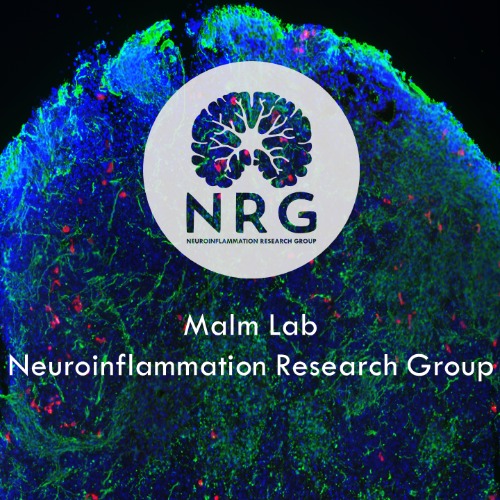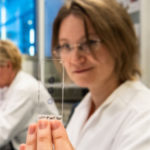
Neuroinflammation research group
Leaders
Goal
The goal of the Neuroinflammation research group is to understand inflammatory cell functions, especially those of microglia and astrocytes and mechanisms and mediators of inflammatory reactions in neurodegenerative diseases, especially Alzheimers disease and stroke. We use interdiciplinary approaches and human based models to find novel targets for modulation of neuroinflammation for the disease benefit.
Research interests
- To form a functional fingerprint of microglia-neuron crosstalk in health and disease
- To identify secreted mediators of this intercellular crosstalk, such as EVs
- To identify how neuroinflammation is regulated at the level of non-conding RNAs
- To identify novel treatment strategies to modulate neuroinflammation for CNS benefit
-
 Acute and slowly degenerative diseases, such as stroke, Alzheimer’s disease (AD) and Parkinson’s disease are all without a cure and although etiologically very distinct, they share common pathological hallmarks. One of the main shared features of these diseases is neuroinflammation geared by activated glia. Instead of supporting neuronal connectivity as they do in the healthy brain, glial cells get activated, secrete, neurotoxic molecules and contribute to neuronal malfunctions.
Acute and slowly degenerative diseases, such as stroke, Alzheimer’s disease (AD) and Parkinson’s disease are all without a cure and although etiologically very distinct, they share common pathological hallmarks. One of the main shared features of these diseases is neuroinflammation geared by activated glia. Instead of supporting neuronal connectivity as they do in the healthy brain, glial cells get activated, secrete, neurotoxic molecules and contribute to neuronal malfunctions.Understanding of glial functions, especially microglia and astrocytes and the interplay between peripheral inflammation and neuroinflammation is the key for development of therapeutics aimed at modulating inflammation for CNS benefit. We believe that proper engagement of beneficial microglial functions offers means to combat neurodegenerative diseases. Our research aims at finding not only disease specific but also common mechanism of neuroinflammation and how these can be taken advantage to modulate neuroinflammation for CNS benefit.
-
 We use novel, human-based models to find new therapeutic targets for the disease benefit and to discover novel biomarkers. We develop new human iPSC-based models including microglia and immunocompetent organoids and use living human brain tissue biopsies. We investigate cellular responses using various omics approaches at the single cell level, electrophysiology and microscopy techniques.
We use novel, human-based models to find new therapeutic targets for the disease benefit and to discover novel biomarkers. We develop new human iPSC-based models including microglia and immunocompetent organoids and use living human brain tissue biopsies. We investigate cellular responses using various omics approaches at the single cell level, electrophysiology and microscopy techniques.In addition, we take advantage of animal modelling with functional outcomes. We utilize several both transgenic and surgically induced animal models of neurodegeneration, especially Alzheimer’s disease and stroke. We carry out research using APP/PS1 and 5XFAD mice to model Alzheimer’s disease and permanent and transient stroke models. The functional outcome is measured by using various behavioral tests with long term follow up time.
-
2021
- Tiia Turunnen received the Orion Research Foundation (Orionin Tutkimussäätiö) grant for Post-doctoral research on Enhancing Neuronal Function with Extracellular Vesicle -Delivered Nuclear microRNAs.
- Ilkka Fagerlund received Suomen Kulttuurirahasto grant (Finnish Cultural Foundation) to support his research for doctoral thesis work for developing a Cerebral organoid model to study the role of immune system in brain development on February. More information here.
- Henna Konttinen also received Suomen Kulttuurirahasto grant (Finnish Cultural Foundation) to study the role of inflammation in Alzheimer’s disease using brain cells generated from patient’s own stem cells on February. More information here.
2020
- 2nd of October, stem cell lab 2 has been opened for Science! The stem cell research in our group has been expanding and thankfully, we have also been able to acquire new equipment in celebration to our advances in the stem cell culture.
- Nea Korvenlaita (Bister), PhD student, received Paavo Nurmi Foundation grant for research expenses.
- Paula Korhonen received a grant from Suomen Kulttuurirahasto (Finnish Cultural Foundation) and a 3-year position as a post-doctoral researcher from the Academy of Finland, for post-doctoral research conducted in our group, related to brain organoids and brain development. Congratulations!
- Flavia Scoyni received a dissertation grant on December from Kuopio University Foundation.
2019
- Flavia Scoyni received a research grant from Instrumentarium Science Foundation on January.
- Three of our PhD student landed a positions in the Doctoral program of Molecular medicine (DPMM)! Congratulations Feroze, Ilkka and Sohvi on great teamwork!
2018
- Flavia Scoyni received Saastamoinen Foundation travel fellowship on May.
- Ilkka Fagerlund received a grant from Suomen Aivosäätiö.
- Podcast interview of Ilkka Fagerlund introducing our research. Listen to the podcast here.
- Blog posting about our research in the Alzheimer Society of Finland web pages. Written by Ilkka Fagerlund. Read it here.
- Our research highlighted in the interview in Saima: Check the interview here.
Interview of Ilkka Fagerlund in Saima: Check the interview here. - We are organized a course on extracellular vesicle biology on 4-5 September, 2018.
- Tiia Turunen received Postdoctoral Researcher funding from the Academy of Finland for investigating novel nuclear non-coding RNAs for the epigenetic treatment of cerebral ischemia. Congratulations!
- Tarja Malm is a part of consortium receiving funding from the Finnish Cultural Foundation to decipher the effects of air pollutants on brain health.
- Flavia Scoyni also received a research grant from Inkeri and Mauri Vanska Foundation on December. Congratulations!
2017
- Nea Korvenlaita (Bister) got the Doctoral program of Molecular medicine (DPMM) fund for PhD studies for 4 years.
- Nea Korvenlaita (Bister) also received the Saastamoinen Foundation Anitta Etula grant for 6 months mobility and research expenses.
- Nea Korvenlaita (Bister) received Paavo Nurmi Foundation grant to attend international conferences.
- Paula Korhonen received grant from Instrumentarium Science Foundation and Suomen Kulttuurirahasto (Finnish Cultural Foundation), for her postdoctoral research in Queensland Institute of Medical Research, Brisbane, Australia.
Keywords
Leaders
Senior Researchers
-
Raisa Giniatullina
Project ResearcherA.I. Virtanen Institute for Molecular Sciences, Faculty of Health Sciences -
Rashid Giniatullin
Research DirectorA.I. Virtanen Institute for Molecular Sciences, Faculty of Health Sciences -

Jukka Jolkkonen
Research DirectorInstitute of Biomedicine, School of Medicine, Faculty of Health Sciences
Post-doctoral Researchers
-

Anastasia Shakirzyanova
Postdoctoral ResearcherA.I. Virtanen Institute for Molecular Sciences, Faculty of Health Sciences -
Akash Mali
Postdoctoral ResearcherA.I. Virtanen Institute for Molecular Sciences, Faculty of Health Sciences -

Anssi Pelkonen
Staff ScientistA.I. Virtanen Institute for Molecular Sciences, Faculty of Health Sciences -
Paula Korhonen
Senior ResearcherA.I. Virtanen Institute for Molecular Sciences, Faculty of Health Sciences -

Luca Giudice
Postdoctoral ResearcherA.I. Virtanen Institute for Molecular Sciences, Faculty of Health Sciences -

Henna Jäntti
Postdoctoral ResearcherA.I. Virtanen Institute for Molecular Sciences, Faculty of Health Sciences -
Nataliia Novosolova
Postdoctoral ResearcherA.I. Virtanen Institute for Molecular Sciences, Faculty of Health Sciences -

Polina Abushik
Postdoctoral ResearcherA.I. Virtanen Institute for Molecular Sciences, Faculty of Health Sciences -

Susanne Michels
Postdoctoral ResearcherA.I. Virtanen Institute for Molecular Sciences, Faculty of Health Sciences -
Liudmila Saveleva
Postdoctoral ResearcherA.I. Virtanen Institute for Molecular Sciences, Faculty of Health Sciences
Doctoral Researchers
-

Sohvi Ohtonen
Visiting ResearcherA.I. Virtanen Institute for Molecular Sciences, Faculty of Health Sciences -

Ahmed Mohamed
Early Stage ResearcherA.I. Virtanen Institute for Molecular Sciences, Faculty of Health Sciences -
Valeriia Sitnikova
Doctoral ResearcherA.I. Virtanen Institute for Molecular Sciences, Faculty of Health Sciences -

Olga Neustroeva
Doctoral ResearcherA.I. Virtanen Institute for Molecular Sciences, Faculty of Health Sciences -

Mireia Gomez Budia
Early Stage ResearcherA.I. Virtanen Institute for Molecular Sciences, Faculty of Health Sciences -

Mohammadamin Beheshti Dehkordi
Doctoral StudentA.I. Virtanen Institute for Molecular Sciences, Faculty of Health Sciences -

Mohammad Rezaie
Doctoral StudentA.I. Virtanen Institute for Molecular Sciences, Faculty of Health Sciences -
Vera Lezhneva
Project ResearcherA.I. Virtanen Institute for Molecular Sciences, Faculty of Health Sciences -
Minna-Mari Tervo
Project ResearcherA.I. Virtanen Institute for Molecular Sciences, Faculty of Health Sciences
Technicians
-
Mirka Tikkanen
Senior Laboratory TechnicianA.I. Virtanen Institute for Molecular Sciences, Faculty of Health Sciences -
Ylli Torn
Research TraineeA.I. Virtanen Institute for Molecular Sciences, Faculty of Health Sciences

